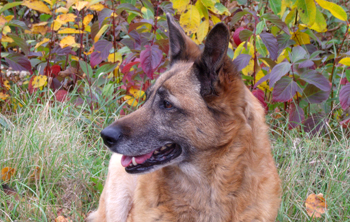Health Topics

(This article was originally published in the November/December 2009 Issue of Pets Magazine and is reproduced here with the permission of the publisher.)
By Kristina Cooper RVT
Just like their human counterparts, dogs will show signs of aging similar to their pet parents, including hearing and vision loss, arthritic changes in joints, decreased exercise tolerance and confusion. Making simple changes, like the ones listed below, will help your senior dog get the most out of their years to come.
Schedule bi-annual general physical exams:
When your dog reaches senior status (usually eight years of age in smaller dogs, with some giant breeds being considered senior as early as five years of age) it is important to increase your veterinary visits to twice yearly. The key to treating any disease is to diagnose the problem in the early stages. Visiting your vet for physical examinations and diagnostic testing (blood work, urinalysis and X-rays) more frequently will allow your vet to pick up on the early signs associated with age related disease. This will allow you to provide the proper treatment in the early stages, which can prolong the progression of disease, giving you more time to enjoy with your dog.
Choose an appropriate senior diet:
As a dog ages their energy requirements are lower because they are often less active. This decreased energy expenditure requires dogs to take in fewer calories than a more playful and active younger dog. Older dogs also have more issues with gastrointestinal troubles, dry hair coats, degenerative joint disease and kidney or liver dysfunction. Choosing a diet that meets their nutritional needs (taking into consideration their age and disease status) will provide them with the best opportunity to age gracefully throughout their golden years.
Consider adjustments in their environment:
When your dog becomes a senior and starts showing signs of aging it may be necessary to assess your environment to see what changes can be made to make life a little easier for your aging furry friend.
- Elevated food dishes can help ease the strain of a stiff neck.
- Orthopaedic beds can provide comfort to aching arthritic hips.
- Consider blocking entrances to stairwells that your dog could fall down should his vision fail him.
- Keeping their nails trimmed and providing a rubber backed no-slip rug can also help provide stability to elderly dogs in areas where flooring is slippery.
- Approach your elderly dog slowly when he is looking in another direction or sleeping. Dogs with hearing loss are easily startled.
- Keep your elderly dog warm and dry as their tolerance to inclement weather is decreased as they age.
- Keep your dog active. Your older dog can benefit from exercise, both mentally and physically, but don't forget to let them tell you when they have had enough.

